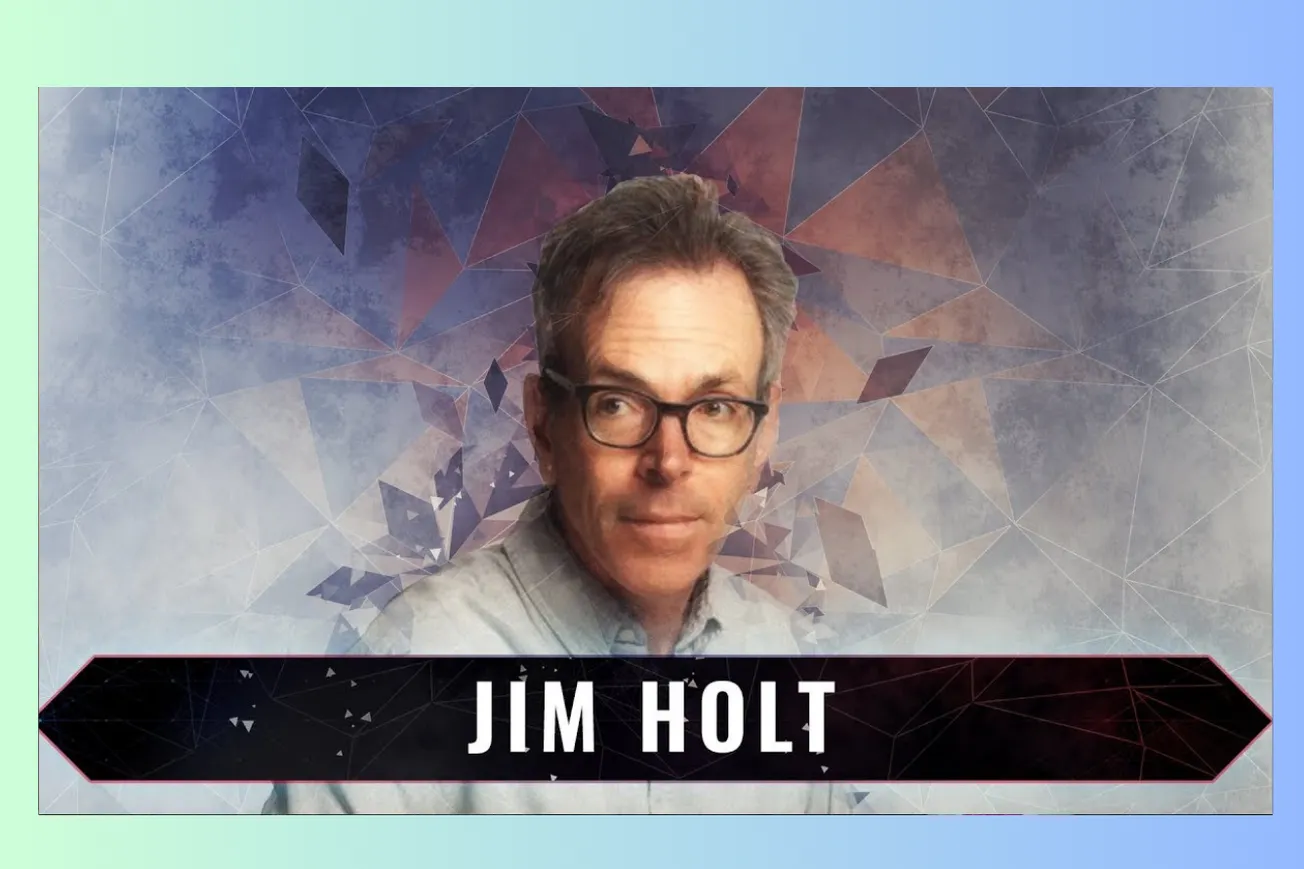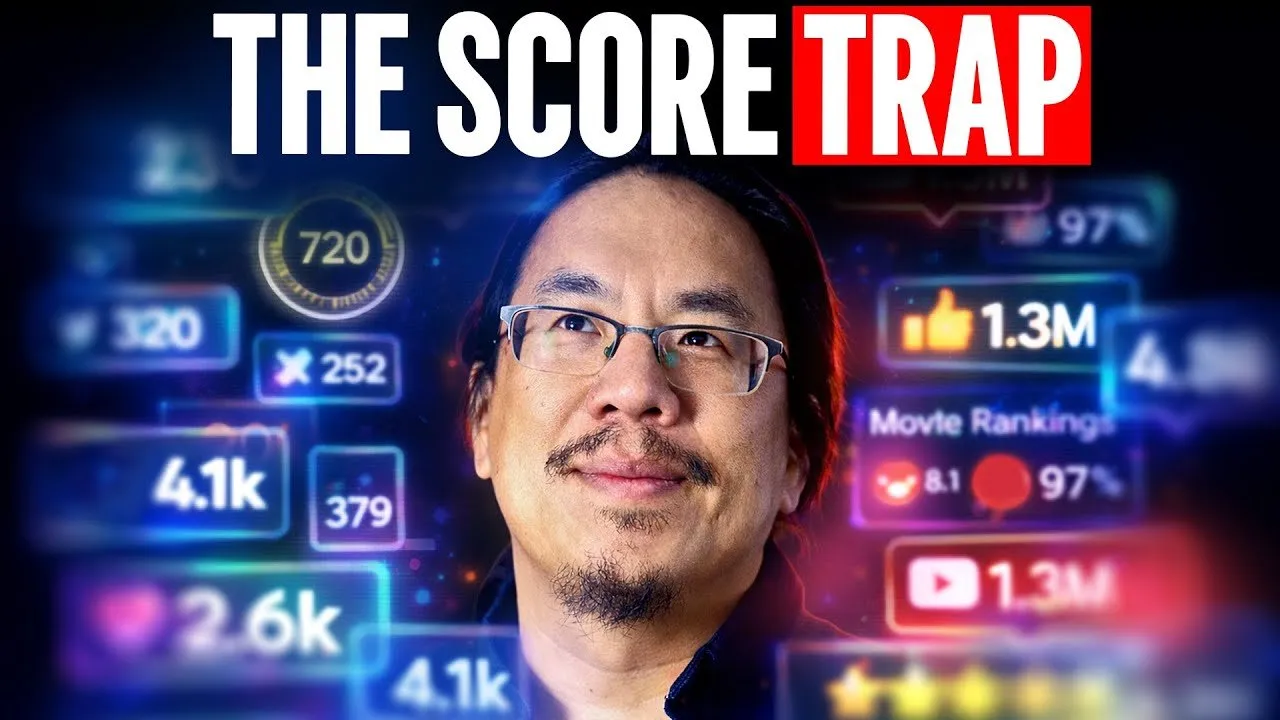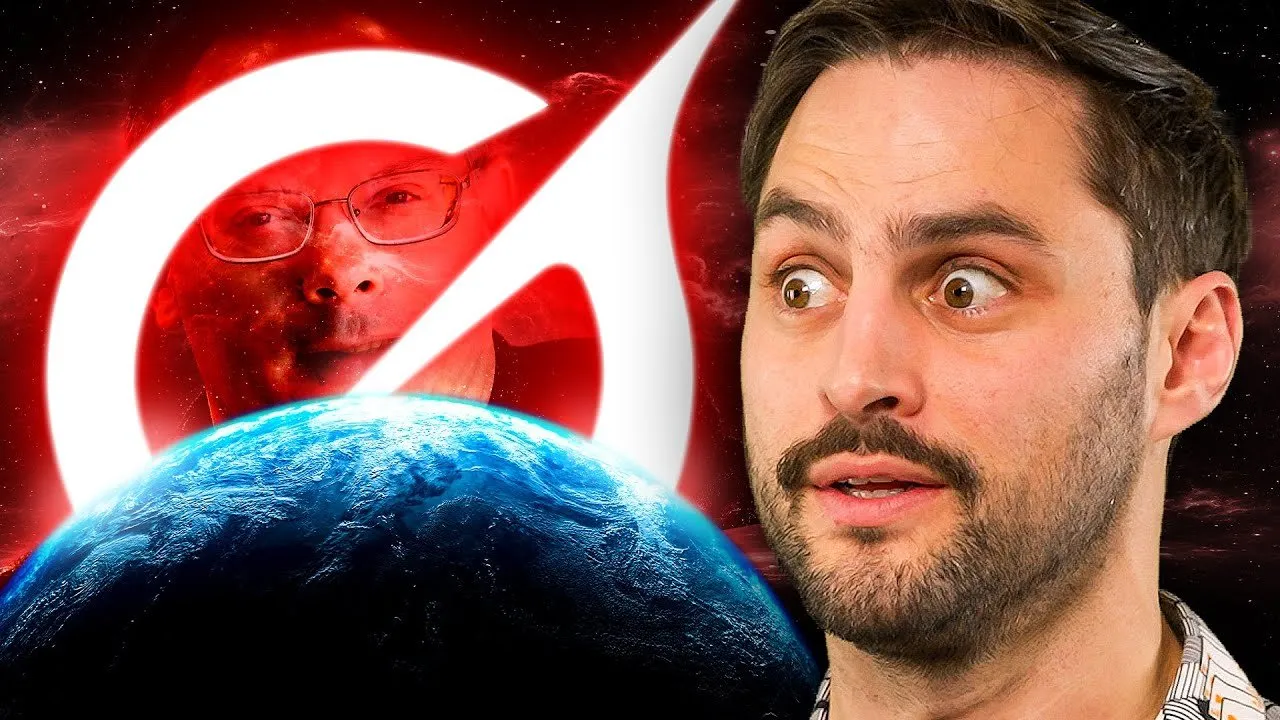Table of Contents
Philosopher and essayist Jim Holt examines the deepest questions of existence, from mathematical reality to consciousness, challenging our assumptions about what we can truly know about the nature of reality.
Key Takeaways
- The fundamental question "Why does the world exist?" represents the ultimate philosophical puzzle that only occurs to metaphysicians or children
- Mathematical genius involves spontaneous generation of novel ideas driven by intellectual pleasure rather than effort or pride
- Mathematics may be discovered eternal truth or invented human tool, with most pure mathematicians believing in its objective reality
- Scientific theories converge on predictive accuracy but diverge wildly in their metaphysical pictures of reality
- Consciousness creates profound problems for understanding reality since it generates the very theories used to explain itself
- Base reality remains fundamentally unknowable through empirical methods constrained by conscious observation
- Society can maintain moral foundations without religious authority, as demonstrated by Scandinavian countries
- The observer problem in quantum mechanics reflects deeper questions about consciousness's role in physical reality
- Godless societies like Scandinavia demonstrate higher moral evolution than religious nations through social trust and cooperation
Timeline Overview
- 00:00–08:30 — Jim Holt's Background and Television Experiences: Philosophical essayist's work across disciplines, traumatic debut on William F. Buckley's Firing Line debating Charles Murray on The Bell Curve, discussion of race and IQ controversies, intellectual humility versus argumentative skill development
- 08:30–15:45 — Intellectual Development and Brain Plasticity: Self-description as "intellectual dilettante" exploring various academic tribes, mathematics and physics communities, loss of brain plasticity after age 35, importance of learning difficult subjects while young, transition from poetry to philosophical writing
- 15:45–22:20 — The Fundamental Question of Existence: Childhood religious explanations preventing philosophical inquiry, discovery of existentialism and continental philosophy as teenager, rejection of religious cosmology leading to metaphysical wondering, premature intellectual closure versus continued questioning
- 22:20–29:15 — Mathematical Genius and Spontaneous Insight: Encounter with philosopher Saul Kripke demonstrating extraordinary intellectual capacity, spontaneous generation of novel mathematical insights during casual conversation, Richard Feynman's derivation abilities and intellectual humility, genius as effortless access to beautiful ideas
- 29:15–36:40 — Mathematics as Discovery versus Invention: Debate over mathematical reality between Platonist and formalist positions, Hartry Field's proof that physics works without numbers, extraterrestrial civilizations sharing mathematical knowledge, Fermat's Last Theorem and prime number universality
- 36:40–43:25 — Scientific Models versus Ultimate Reality: Science converging on predictive accuracy while diverging on metaphysical interpretations, Newtonian versus Einsteinian worldviews providing similar predictions, quantum mechanics dissolving matter into pure mathematics, David Albert's universal wavefunction interpretation
- 43:25–50:10 — Consciousness and the Observer Problem: Quantum mechanics debates about consciousness role in physical reality, Einstein versus Bohr disagreements about observation, participatory universe theories involving consciousness generation, scientific realism versus phenomenological interpretation
- 50:10–57:35 — The Limits of Knowledge and Base Reality: Matrix hypothesis as untestable possibility, models providing better predictions without revealing reality itself, consciousness creating theories to explain consciousness, Gödel's incompleteness theorem applied to self-understanding systems
- 57:35–64:20 — Moral Foundations Without Religion: Scandinavian countries as examples of godless societies with high moral evolution, Euthyphro dilemma about goodness preceding divine command, social trust and cooperation without religious authority, residual Christian moral heritage in secular contexts
The Nature of Philosophical Inquiry and Intellectual Development
- Jim Holt describes himself as an "intellectual dilettante" who gains access to various academic communities without committing to any single discipline, spending time with mathematicians, physicists, and philosophers to observe their methods and concerns. This approach enables synthesis across fields while maintaining critical distance from specialized orthodoxies.
- Brain plasticity loss beginning around age 35 creates urgent imperatives for young people to master difficult subjects requiring symbolic and quantitative thinking while their neural circuits remain flexible. Mathematical training provides foundational skills that enable later intellectual snobbery and resistance to intimidation by experts.
- Premature intellectual closure during childhood through religious explanations can prevent fundamental philosophical questioning from emerging naturally. Holt's Catholic upbringing with satisfying creation stories delayed his encounter with existential mysteries until teenage discovery of French existentialism and continental philosophy.
- The transition from poetry to philosophical writing reflects movement from aesthetic to analytical modes of engagement with fundamental questions. Failed artistic ambitions can redirect intellectual energy toward more systematic exploration of concepts that initially attracted creative expression.
- Television appearances reveal the gap between scholarly analysis and public debate performance, where rhetorical skill often matters more than logical rigor. Charles Murray's television expertise overwhelmed Holt's philosophical arguments despite stronger intellectual foundations.
- Mathematical genius manifests as spontaneous generation of novel insights during casual conversation, driven by intellectual pleasure rather than professional necessity. Saul Kripke's effortless production of original ideas about infinity exemplifies how great minds access abstract beauty without apparent effort.
Mathematical Reality and the Discovery versus Invention Debate
- Most pure mathematicians embrace Platonic realism, believing mathematical objects exist independently of human thought and that mathematical research resembles astronomical observation of pre-existing reality. This conviction sustains their dedication to abstract research despite apparent disconnection from practical applications.
- Hartry Field's "Science Without Numbers" demonstrates that classical physics can operate without positing numerical existence, using only space-time point sets as physical entities. This technical proof undermines arguments for mathematical necessity while preserving scientific functionality through alternative formulations.
- Extraterrestrial contact scenarios typically assume mathematical universality, particularly prime number sequences, as the most likely foundation for communication between intelligent civilizations. This assumption reflects belief in mathematical objectivity transcending cultural and biological differences.
- Contemporary mathematical proofs have become so complex that understanding requires specialized knowledge beyond most PhD-level mathematicians, creating verification problems within the mathematical community itself. The Japanese mathematician's ABC conjecture proof exemplifies how advanced mathematics approaches incomprehensibility even for experts.
- Fermat's Last Theorem represents the pinnacle of number theory accessibility, where everyone can understand the problem statement but virtually no one can comprehend Andrew Wiles's thousand-page proof. This gap between elementary formulation and advanced solution reveals mathematics' hierarchical complexity structure.
- Richard Feynman's casual derivation of electromagnetism from quantum mechanical principles illustrates how mathematical genius operates through playful exploration rather than systematic research programs. Such spontaneous insights emerge from deep pattern recognition rather than deliberate problem-solving strategies.
Scientific Knowledge and the Limits of Empirical Understanding
- Scientific theories achieve remarkable predictive convergence while maintaining radical divergence in their metaphysical interpretations of reality's fundamental nature. Newtonian and Einsteinian physics provide nearly identical predictions for most practical purposes while offering completely different pictures of space, time, and matter.
- NASA's continued use of Newtonian mechanics for spacecraft navigation demonstrates how older theories retain practical utility despite theoretical obsolescence. Scientific progress involves better approximations rather than absolute truth discovery, suggesting pragmatic rather than metaphysical understanding.
- Contemporary physics dissolves apparent material reality into pure mathematical structures, with elementary particles described as "irreducible representations of the Lorentz group" rather than substantial entities. This mathematical reduction challenges naive materialism while raising questions about reality's fundamental nature.
- David Albert's interpretation of quantum mechanics as universal wavefunction evolution in infinite-dimensional Hilbert space represents current scientific orthodoxy that may appear as "crazy medieval stuff" to future scientists. Scientific theories face inevitable replacement by radically different conceptual frameworks.
- The atomic model's evolution from solid billiard balls to 99.99% empty space with mathematical field distributions illustrates how deeper investigation undermines common-sense material intuitions. Reality's apparent solidity dissolves under scientific scrutiny into abstract mathematical relationships.
- Cosmological discoveries including universal expansion acceleration require resurrection of Einstein's cosmological constant, transforming his "greatest blunder" into essential theoretical component. This historical reversal demonstrates science's non-linear progress through error correction and theoretical rehabilitation.
Consciousness, Observation, and the Quantum Measurement Problem
- The Copenhagen interpretation of quantum mechanics assigns fundamental roles to conscious observers in determining physical reality, creating philosophical problems about consciousness's relationship to material processes. This interpretation challenges scientific objectivity by making observer participation essential to physical description.
- Einstein's resistance to observer-dependent physics through his famous question about whether God requires mouse observation to change reality reflects deeper commitments to objective scientific description independent of conscious participation. This debate continues dividing physicists and philosophers into opposing camps.
- John Archibald Wheeler's "participatory universe" concept suggests mutual constitution between consciousness and physical reality, where human observation partly creates the observed world. Such theories blur traditional distinctions between subjective experience and objective physical processes.
- David Chalmers's panpsychist speculation that consciousness might be fundamental to all matter, including elementary particles, represents one attempt to solve the hard problem of consciousness emergence from non-conscious components. This theory attributes proto-consciousness to neutrons and electrons.
- The measurement problem in quantum mechanics reveals deeper conceptual difficulties about how macroscopic classical reality emerges from quantum mechanical foundations. Multiple competing interpretations offer radically different solutions while maintaining identical predictive capabilities.
- Recent international conferences on quantum foundations demonstrate the continuing vehemence of debates about consciousness's role in physics, with physicists and philosophers "calling each other crazy" over fundamental interpretational questions that remain unresolved after nearly a century.
The Problem of Base Reality and Epistemological Limits
- The Matrix hypothesis represents a modern formulation of ancient skeptical scenarios where empirical experience provides no reliable access to ultimate reality's nature. Such possibilities cannot be empirically refuted because they account for all possible observational evidence.
- Scientific models function as increasingly sophisticated tools for experiential prediction and control rather than revelations of reality's intrinsic nature. This pragmatic interpretation avoids metaphysical commitments while acknowledging science's practical success.
- Consciousness creates fundamental problems for self-understanding because it generates the very theories and concepts used to explain consciousness itself. This creates potential circularity where conscious beings study consciousness using consciousness-generated methods and categories.
- Kurt Gödel's incompleteness theorems suggest that no logical system can fully encompass mathematical truth, raising questions about whether conscious systems can achieve complete self-understanding. Applied to consciousness studies, this implies potential fundamental limitations on introspective knowledge.
- Andre Linde's acknowledgment that science describes experience structures rather than mind-independent reality reflects growing recognition among cosmologists of epistemological constraints on scientific knowledge. Even inflationary cosmology may describe observational patterns rather than objective cosmic history.
- The question "what would base reality be like?" may itself be misconceived if it assumes categories and concepts that only apply within conscious experience. Asking about reality's nature apart from consciousness may be like asking about color's appearance to beings without visual systems.
Moral Foundations in Secular Societies
- Scandinavian countries demonstrate that societies can maintain high moral standards, social trust, and cooperative institutions without religious authority or widespread belief in divine commands. These nations exhibit lower crime, corruption, and violence than more religious societies.
- The Euthyphro dilemma establishes that moral goodness either exists independently of divine commands or represents arbitrary divine preferences. If goodness has independent existence, rational investigation can discover moral truth without religious revelation or authority.
- Sweden, Denmark, and Finland represent "some of the most morally highly evolved nations" with sophisticated social welfare systems, high levels of interpersonal trust, and effective institutions for collective problem-solving. These achievements suggest secular moral development possibilities.
- Residual Christian moral heritage in Scandinavian countries may provide historical foundation for contemporary secular institutions, but current moral practice operates independently of religious beliefs or divine command theories. Social cooperation emerges from shared rational commitments rather than religious obedience.
- The transition from religious to secular morality demonstrates that moral intuitions and practices can survive theological framework abandonment while retaining their motivational force and social effectiveness. Core moral decency persists through cultural evolution.
- American exceptionalism in religious belief among developed nations creates distinctive challenges for moral discourse and political cooperation compared to more secular European democracies. Higher religiosity correlates with various social problems rather than moral superiority.
Genius, Creativity, and the Limits of Human Understanding
- Mathematical and scientific genius manifests through effortless generation of novel insights during casual conversation, suggesting access to abstract patterns and relationships invisible to ordinary intelligence. True genius operates through intellectual pleasure rather than deliberate effort or professional ambition.
- Saul Kripke's spontaneous production of original ideas about infinity during telephone conversations exemplifies how great minds perceive beautiful mathematical relationships that escape systematic research efforts. Such insights emerge from pattern recognition rather than analytical methodology.
- Richard Feynman's derivation of electromagnetism from quantum mechanics "just to amuse himself" demonstrates how genius operates through playful exploration of theoretical possibilities. The ease of such achievements reflects deep intuitive understanding rather than technical virtuosity.
- The personality requirements for philosophical genius may include lack of emotional intelligence that prevents appropriate intimidation by authority figures. Gödel's fearless engagement with Einstein reflected immunity to social hierarchies rather than mere intellectual confidence.
- Contemporary mathematical proofs have become so technically demanding that understanding requires specialized knowledge exceeding most professional mathematicians' capabilities. This creates verification crises where mathematical truth becomes accessible only to tiny expert communities.
- The ABC conjecture proof situation, where understanding the proof makes one incomprehensible to other mathematicians, suggests that human cognitive limitations may constrain mathematical progress. Knowledge advancement may outpace human communication and verification capabilities.
Conclusion
Jim Holt's philosophical exploration reveals the profound limitations of human knowledge while celebrating the magnificent ambition of intellectual inquiry. His journey from failed poet to philosophical essayist demonstrates how failed aesthetic projects can redirect energy toward systematic investigation of the deepest questions about existence, consciousness, and reality. The conversation illuminates how scientific progress provides increasingly accurate predictions while offering radically divergent metaphysical interpretations, suggesting that ultimate reality remains fundamentally inaccessible to empirical investigation.
Consciousness emerges as both the tool and the mystery, generating theories to explain itself while remaining opaque to its own analysis. The mathematical universe may represent either objective reality discovered by human intelligence or sophisticated illusion projected by conscious minds onto experiential patterns.
Future Predictions
- Mathematical verification crisis — Increasing proof complexity will outpace human comprehension abilities, requiring AI assistance for mathematical truth verification and potentially transforming mathematical practice itself
- Consciousness studies revolution — Panpsychist theories will gain scientific respectability as neuroscience fails to explain consciousness emergence from non-conscious matter, fundamentally altering our understanding of mental reality
- Scientific metaphysics proliferation — Continued divergence between predictive accuracy and theoretical interpretation will spawn multiple incompatible worldviews all consistent with observational evidence
- Secular moral development — More societies will follow Scandinavian models, developing sophisticated ethical institutions without religious foundations while maintaining social cooperation and individual flourishing
- Quantum interpretation resolution — Technological advances enabling previously impossible experiments will finally resolve observer role debates in quantum mechanics, potentially favoring objective reality interpretations
- AI philosophical impact — Artificial intelligence development will force reconsideration of consciousness theories, potentially demonstrating that sophisticated behavior emerges without subjective experience
- Epistemological humility growth — Recognition of knowledge limitations will spread through scientific communities, moderating claims about ultimate reality while preserving pragmatic research effectiveness
- Religious-secular synthesis — New philosophical frameworks will emerge combining scientific naturalism with meaning-making traditions, offering alternatives to both fundamentalist religion and reductive materialism
- Mathematical Platonism decline — Computer-assisted proof verification will reveal mathematics as human construction rather than objective discovery, transforming how we understand abstract reasoning
- Reality simulation acceptance — Matrix-style scenarios will become mainstream possibilities in physics and philosophy, forcing practical ethics to operate without metaphysical certainty about simulation versus base reality





